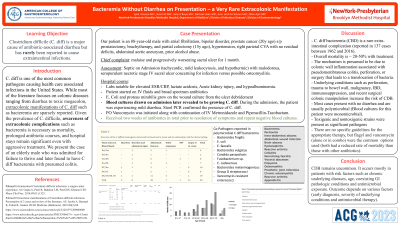Monday Poster Session
Category: Colon
P1708 - Bacteremia Without Diarrhea on Presentation - A Rare Extracolonic Manifestation
Monday, October 23, 2023
10:30 AM - 4:15 PM PT
Location: Exhibit Hall

Has Audio
- SH
Syed Hassan, MD
NYP Brooklyn Methodist Hospital
Brooklyn, NY
Presenting Author(s)
Syed Hassan, MD1, Sharif Ali, MD2, Kelly O'Boyle, MD3, Michael Liben, MD2, Amir Latifi-M-Tehrani, MD3, Ofem Ajah, MD3
1NYP Brooklyn Methodist Hospital, Brooklyn, NY; 2NYP Brooklyn Methodist, Brooklyn, NY; 3New York Methodist Hospital, Brooklyn, NY
Introduction: Clostridium Difficile (C. diff.) is a common cause of healthcare associated infections in the United States. While the spectrum of colonic manifestations from diarrhea to toxic megacolon are much better studied, extracolonic complications of C. diff. such as bacteremia are rare. We present a case of an elderly male with extensive comorbidities who was admitted for deconditioning and found to have C. diff. bacteremia with presumed colitis.
Case Description/Methods: Our patient was an 88 year old male with a medical history of prostate cancer (s/p prostatectomy, radiation, and partial colectomy), CVA, and prior alcohol abuse, brought in for a worsening sacral ulcer, notably without diarrhea. He was septic on admission, presumably due to a large, necrotic, stage IV sacral ulcer. Labs were notable for elevated ESR and CRP, lactic acidosis, Acute Kidney Injury and hypoalbuminemia. His urine culture was negative; his sacral wound culture grew E. Coli and Proteus mirabilis. A set of blood cultures was initially negative as well. He was treated for his sacral wound with IV Vancomycin and Ceftriaxone. A few days later, the blood cultures drawn on admission grew C. diff. Additionally, the patient was now experiencing mild diarrhea and stool PCR confirmed C. diff. as well. PO vancomycin was initiated along with IV Flagyl and Zosyn. His IV Vancomycin and Ceftriaxone were discontinued. He underwent 2 weeks of IV therapy with resolution of symptoms. His repeat blood cultures were negative and he was discharged home thereafter.
Discussion: Bacteremia is a rare cause of extraintestinal C. diff. infection. Literature review spanning 30 years revealed the incidence of such manifestations at less than one percent. Most cases present with no diarrhea and are usually polymicrobial. Blood cultures in our patient were monomicrobial. Our patient had numerous risk factors for C. diff. infection such as recent antibiotic use, declining functional status, immunocompromise from multiple chronic disease states, prior GI surgery with previous radiation therapy, multiple sacral ulcers, and a wound debridement. It is most probably that C. diff. translocation occurred in our patient due to radiation colitis, but his multiple comorbidities make it difficult to identify specific predisposing factors. Prompt sepsis protocol treatment favored our patient’s stability, but our case highlights the importance of understanding the pathogenesis of extracolonic C. diff. manifestations, given their high mortality.
Disclosures:
Syed Hassan, MD1, Sharif Ali, MD2, Kelly O'Boyle, MD3, Michael Liben, MD2, Amir Latifi-M-Tehrani, MD3, Ofem Ajah, MD3. P1708 - Bacteremia Without Diarrhea on Presentation - A Rare Extracolonic Manifestation, ACG 2023 Annual Scientific Meeting Abstracts. Vancouver, BC, Canada: American College of Gastroenterology.
1NYP Brooklyn Methodist Hospital, Brooklyn, NY; 2NYP Brooklyn Methodist, Brooklyn, NY; 3New York Methodist Hospital, Brooklyn, NY
Introduction: Clostridium Difficile (C. diff.) is a common cause of healthcare associated infections in the United States. While the spectrum of colonic manifestations from diarrhea to toxic megacolon are much better studied, extracolonic complications of C. diff. such as bacteremia are rare. We present a case of an elderly male with extensive comorbidities who was admitted for deconditioning and found to have C. diff. bacteremia with presumed colitis.
Case Description/Methods: Our patient was an 88 year old male with a medical history of prostate cancer (s/p prostatectomy, radiation, and partial colectomy), CVA, and prior alcohol abuse, brought in for a worsening sacral ulcer, notably without diarrhea. He was septic on admission, presumably due to a large, necrotic, stage IV sacral ulcer. Labs were notable for elevated ESR and CRP, lactic acidosis, Acute Kidney Injury and hypoalbuminemia. His urine culture was negative; his sacral wound culture grew E. Coli and Proteus mirabilis. A set of blood cultures was initially negative as well. He was treated for his sacral wound with IV Vancomycin and Ceftriaxone. A few days later, the blood cultures drawn on admission grew C. diff. Additionally, the patient was now experiencing mild diarrhea and stool PCR confirmed C. diff. as well. PO vancomycin was initiated along with IV Flagyl and Zosyn. His IV Vancomycin and Ceftriaxone were discontinued. He underwent 2 weeks of IV therapy with resolution of symptoms. His repeat blood cultures were negative and he was discharged home thereafter.
Discussion: Bacteremia is a rare cause of extraintestinal C. diff. infection. Literature review spanning 30 years revealed the incidence of such manifestations at less than one percent. Most cases present with no diarrhea and are usually polymicrobial. Blood cultures in our patient were monomicrobial. Our patient had numerous risk factors for C. diff. infection such as recent antibiotic use, declining functional status, immunocompromise from multiple chronic disease states, prior GI surgery with previous radiation therapy, multiple sacral ulcers, and a wound debridement. It is most probably that C. diff. translocation occurred in our patient due to radiation colitis, but his multiple comorbidities make it difficult to identify specific predisposing factors. Prompt sepsis protocol treatment favored our patient’s stability, but our case highlights the importance of understanding the pathogenesis of extracolonic C. diff. manifestations, given their high mortality.
Disclosures:
Syed Hassan indicated no relevant financial relationships.
Sharif Ali indicated no relevant financial relationships.
Kelly O'Boyle indicated no relevant financial relationships.
Michael Liben indicated no relevant financial relationships.
Amir Latifi-M-Tehrani indicated no relevant financial relationships.
Ofem Ajah indicated no relevant financial relationships.
Syed Hassan, MD1, Sharif Ali, MD2, Kelly O'Boyle, MD3, Michael Liben, MD2, Amir Latifi-M-Tehrani, MD3, Ofem Ajah, MD3. P1708 - Bacteremia Without Diarrhea on Presentation - A Rare Extracolonic Manifestation, ACG 2023 Annual Scientific Meeting Abstracts. Vancouver, BC, Canada: American College of Gastroenterology.
